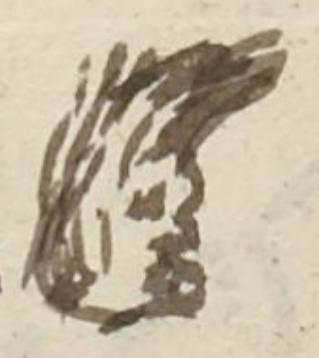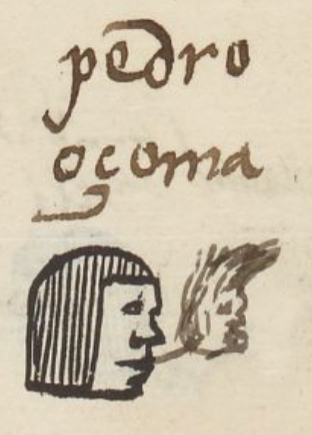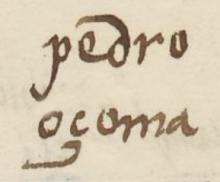Ozoma (MH499r)
This black-line drawing of the simplex glyph for the personal name Ozoma, attested here as a man's name, shows the head of a monkey (ozomatli) in profile, facing toward the viewer's right. It has somewhat messay, longish hair standing up on end and leaning forward.
Stephanie Wood
The glyph for monkey very typically shows the hair (tzontli) on the top of its head standing up, and sometimes the hair is long and thick, and so very noticeable. Perhaps this portrayal of hair is meant to serve as a phonetic complement for the "zom" in the middle of the root ozoma, given that "tzon-" stands for hair.
The ozomatli is a day sign in the calendar, so it was given as a name to babies born on its day. There was also a divine force or deity named Ozomatli, which, according to Desmond Morris (Monkey, 2013, 41), was "the companion spirit and servant of the god Xochipilli, the deity of music and dance. In paintings it is depicted dressed in malinalli herbs and with white, oval earrings with pointed ends."
Stephanie Wood
pedro
oçoma
Pedro Ozoma
Stephanie Wood
1560
Jeff Haskett-Wood
monkeys, monos, calendarios, tonalpohualli, días, deidades, deities, divinities, divine forces, ozomatli, nombres de hombres

ozoma(tli), monkey, https://nahuatl.wired-humanities.org/content/ozomatli
El Mono
Stephanie Wood
Matrícula de Huexotzinco, folio 499r, World Digital Library, https://www.loc.gov/resource/gdcwdl.wdl_15282/?sp=77&st=image
This manuscript is hosted by the Library of Congress and the World Digital Library; used here with the Creative Commons, “Attribution-NonCommercial-ShareAlike 3.0 License” (CC-BY-NC-SAq 3.0).




